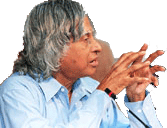 The only brief exposure that he got abroad was in
1963-64 when he was invited by NASA
(National Aeronautics and Space Administration) to spend four months in the United States at
the Wallops Island Rocketry Centre and the Langley Research
Centre.
The only brief exposure that he got abroad was in
1963-64 when he was invited by NASA
(National Aeronautics and Space Administration) to spend four months in the United States at
the Wallops Island Rocketry Centre and the Langley Research
Centre.
| APJ Abdul Kalam |
Avul Pakir Jainulabdeen Abdul Kalam was born on October 15th, 1931 in Rameswaram, Tamilnadu. He began his schooling at "Samiyar" school and continued it at Schwartz High School in Rameswaram. Graduation was from St. Joseph's College in Tiruchi after which he completed a diploma in Aeronautical Engineering from the Madras Institute of Technology (MIT). He joined the Defense Research Development Organisation (DRDO) in 1958.
His first project was a hovercraft. In 1962, he left DRDO and joined the Indian Space Research Organisation (ISRO). India's scientific satellite Rohini was put into orbit in July 1980 when he was the Project Director for SLV-3 project at Thiruvananthapuram. Vikram Sarabhai as the head provided him the encouragement. He went back as Director to DRDL, Hyderabad to head the country's Integrated Missile Development Programme. It was India's most successful military research task to date. It was submitted to the then Defence Minister Mr. R. Venkataraman. Kalam succeeded in uniting 12 universities, 30 defence laboratories, the CSIR, the ISRO and dozens of public and private sector undertakings in the task . His codenames for the programme's five components were:
After 10 years in DRDL, he went to Delhi to take over as Scientific Adviser to the Defence Minister . Other projects, such as the Main Battle Tank (MBT) Arjun and the Light Combat Aircraft (LCA) were soon to follow.
 The only brief exposure that he got abroad was in
1963-64 when he was invited by NASA
(National Aeronautics and Space Administration) to spend four months in the United States at
the Wallops Island Rocketry Centre and the Langley Research
Centre.
The only brief exposure that he got abroad was in
1963-64 when he was invited by NASA
(National Aeronautics and Space Administration) to spend four months in the United States at
the Wallops Island Rocketry Centre and the Langley Research
Centre.
Kalam is a strict vegetarian and a great humanitarian. The metal supports of disabled children which weighed 3 kgs was replaced by him by Carbon braces which weighed just 300 gms. He has remained a "brahmachari" devoting his life to the development of Mother India. Adept at playing the "rudra veena", his pastimes included reading scriptures like Bagavad Gita and writing Tamil poems.
Awards received:
| Padma Bhushan in 1981. |
| Padma Vibhushan in 1990. |
| Bharat Ratna in 1997 |
Other articles:
Abdul Kalam's Vision of India 2020
Abdul Kalam promises faster SuperComputer
| Back |